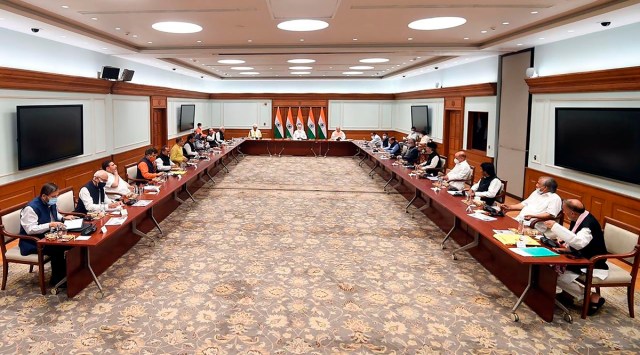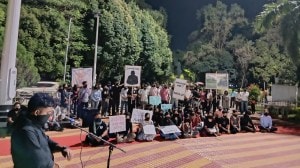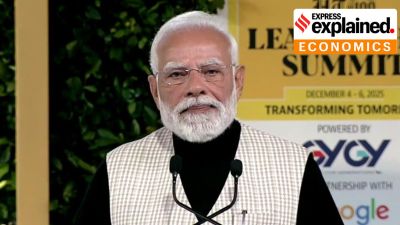Stay updated with the latest - Click here to follow us on Instagram
J&K talks: Here’s what unfolded at the first meet and what lies ahead
What happens next – whether the meeting is a photo-op or the start of a process will be known in the way the Centre picks up the threads. Some leaders have suggested that, perhaps, a more structured process will help build on what was achieved.
 Members of various political parties with Prime Minister Narendra Modi and Home Minister Amit Shah in New Delhi, Thursday, June 24, 2021. (Prime Minister's Office via AP)
Members of various political parties with Prime Minister Narendra Modi and Home Minister Amit Shah in New Delhi, Thursday, June 24, 2021. (Prime Minister's Office via AP)Prime Minister Narendra Modi held a meeting with leaders of Jammu and Kashmir for three and a half hours on Thursday, his first direct engagement with them in almost two years. During the meeting, PM Modi assured the Valley’s leaders that his government was committed to reviving the democratic process through Assembly elections as early as possible and sought their participation in the delimitation exercise.
Among those who attended the meeting were at the Prime Minister’s residence were former chief ministers Farooq Abdullah and Omar Abdullah (National Conference), Ghulam Nabi Azad (Congress), Mehbooba Mufti (PDP), former Deputy CMs and heads of all parties in J&K.
Many of the leaders underwent long detentions following the stripping of the erstwhile state’s special status and its division into two Union Territories.
J&K polls first, statehood later, says PM; parties welcome move
The Prime Minister told the leaders he wanted to meet them earlier, but could not do so due to the outbreak of Covid-19. He was keen the delimitation exercise be completed at the earliest so that elections could be held soon.
The PM, sources told The Indian Express, underlined that he wanted to reduce both “Dil ki Doori” and “Dilli ki doori” — the distancing of hearts and the distancing from Delhi.
While the issue of reinstating Article 370 was raised at the meeting, especially by Mehbooba Mufti, the government, sources said, took the stand that the matter was sub judice and the Supreme Court would take a decision on it.
 Prime Minister Narendra Modi during an all-party meeting with various political leaders from Jammu and Kashmir, in Delhi, Thursday, June 24, 2021. (PTI Photo)
Prime Minister Narendra Modi during an all-party meeting with various political leaders from Jammu and Kashmir, in Delhi, Thursday, June 24, 2021. (PTI Photo)
J&K to Delhi, meeting to bridge a gap
As the government broke the ice with the political leadership of Jammu and Kashmir, the meeting saw a free and frank exchange of views. Several opposition leaders told The Indian Express there was no bitterness and that they could speak their mind even as the Centre unveiled the roadmap for delimitation, holding of Assembly elections and restoration of statehood.
The meeting saw opposition leaders venting their unhappiness over the manner in which J&K was split, downgraded into two UTs as also the events that unfolded since August 5, 2019, including incarceration of the political leadership.
“We told the Prime Minister that the trust between J&K and the Centre has been broken. We said it is the responsibility of the government to regain that trust,” National Conference leader Omar Abdullah said.
Ghulam Nabi Azad: ‘Statehood should be restored first, then elections’
At the meeting, senior Congress leader and former J&K chief minister Ghulam Nabi Azad presented five key demands of his party: early statehood, Vidhan Sabha elections at the earliest, guarantees to local people on government jobs, property and domiciles, rehabilitation of Kashmiri Pandits, and release of all political prisoners.
In an interview after, he told The Indian Express, “I made it clear… I stopped the Home Minister and said that on behalf of everybody here… I would like to say that once the delimitation process is over… statehood should be restored first and then elections should be held.”
 Prime Minister Narendra Modi chaired the meeting. He is seen with Union Home Minister Amit Shah and Lt. Gov. of Jammu and Kashmir Manoj Sinha. (PTI Photo)
Prime Minister Narendra Modi chaired the meeting. He is seen with Union Home Minister Amit Shah and Lt. Gov. of Jammu and Kashmir Manoj Sinha. (PTI Photo)
Across the spectrum: What UT’s leaders said after J&K talks
Farooq Abdullah said there was a lost of trust which needs to be restored immediately. Omar Abdullah said one meeting with the government was not enough for ‘dil ki doori and Dilli ki doori’, but a process has begun. Mehbooba Mufti requested the PM that, if need be, India talks to Pakistan again for further boosting the peace process.
PDP leader Muzaffar Hussain Baig said following the meeting that all party’s had demanded statehood. Sajad Lone, People’s Conference Leader, said he was positive there would hopefully be some delivery for the people of Jammu and Kashmir.
Srinagar-Delhi ice cracks in a bit of warmth but political thaw is long haul
Round 1 may have gone to the Centre — it sent the right signals to the domestic and international audience. But the mainstream political parties in the Valley did return with hope and some solace — that the Centre has to deal with them.
They are back from the cold. What happens next – whether the meeting is a photo-op or the start of a process will be known in the way the Centre picks up the threads. Some leaders have suggested that, perhaps, a more structured process will help build on what was achieved. How they participate in the delimitation process could be the first test.
 Prime Minister Narendra Modi poses for a photograph with the political leaders from Jammu and Kashmir, in Delhi. (PTI Photo)
Prime Minister Narendra Modi poses for a photograph with the political leaders from Jammu and Kashmir, in Delhi. (PTI Photo)
Opinion: The neighbourhood factor in J&K talks
Former diplomat Vivek Katju writes in The Indian Express today: Shifts in Afghanistan’s power matrix and out-of-sight interactions between India and Pakistan provide the context to the dialogue between PM Modi and J&K’s mainstream leadership.







